When the going gets tough, the tough get angry. When nature is having a hard time, she lashes out. The same goes for honey bees, as they can turn aggressive too. When they do so, it’s usually because they are going through some kind of hardship.
Alternatively, in times of plenty, they’ll endure your visits with a calm and friendly greeting.
When things get tough, they’ll let you know. But that’s not all that sets them off. Let’s look at some of the main reasons why bees get aggressive.
11 Main Causes for Aggressive Honey Bees
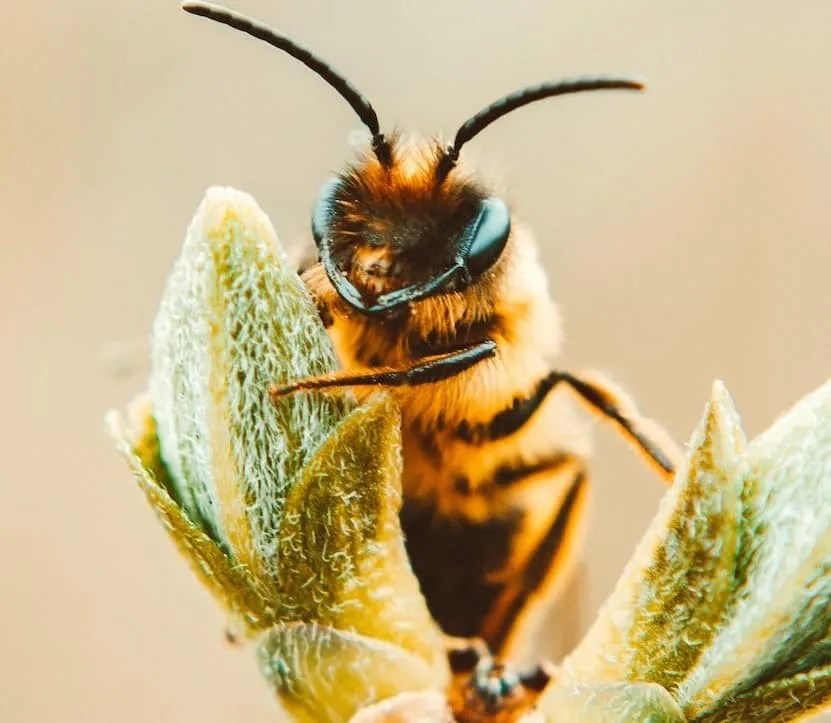
As an experienced beekeeper, I have encountered many aggressive hives and angry bees in my day. This type of behavior is normal and to be expected as you progress in your journey.
I frequently work with both beginner and intermediate beekeepers who have trouble figuring out a bee’s aggressive behavior. I’ve done my best to lay out all the reasons which cause honey bees to become angry.
By understanding these reasons, I feel confident that you’ll be able to pinpoint the cause so you can quickly remedy your aggressive hive!
1. Genetics
Sometimes, the apple simply falls right under the tree. Usually, aggression is cyclic, and the colony will only be aggressive and testy at certain times of the year. This period is usually very brief.
However, if you notice that your colony is steadily getting more aggressive than when you first got them, regardless of the season, then aggression could be running through their bee blood.
If the colony has swarmed after initiating a new queen, or you introduced a locally bred queen, then you are exposing yourself to the risk of hosting an aggressive colony.
In the case of swarming or a queen’s death, the new queen bee will mate with whatever drones happen to be at the mating spot.
Naturally, you don’t have any control over what drones will be hanging around, hollering at pretty young queens.
If these drones come from aggressive bee species, they’ll pass such aggressive genes to their offspring, and you end up with grumpy bees.
2. Lack of a Bee Smoker or Using One Incorrectly
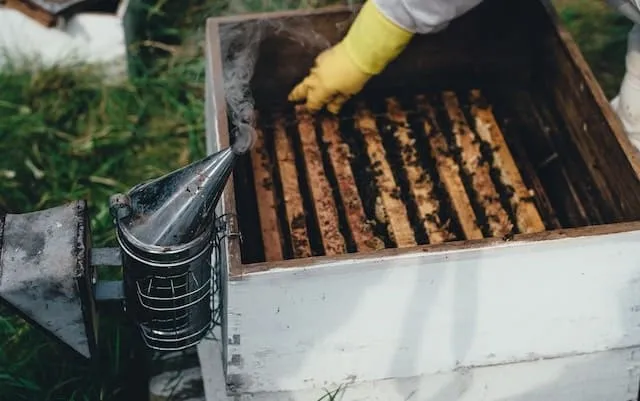
During hive inspections, beekeepers use smokers the same way the Secret Service uses signal jammers, or so I’ve heard.
The smoke interrupts the alarm pheromone and causes the bees to fill up on honey. Smokers calm bees, making them much easier to work around.
Too much smoke or too little can cause the bees to get agitated. Not having a smoker at all can be a huge mistake.
When you open up a hive, and you hear a loud hum, that’s the equivalent of a siren. The greater the hum, the faster the alarm pheromones travel. If you have a very docile colony, you might get away with it, but it simply isn’t worth the risk.
3. Nectar Dearth
Being hungry is always an excuse for our industrious friends to be cranky bees. Have you ever been “hangry” before? For bees, even when they have enough honey, they get paranoid.
All bees are not created equal. Some honey bee colonies may either have too many mouths to feed or too little honey stored in their pantry. Honey then becomes a very precious commodity, and the last thing the bees want is visitors.
It gets so bad that they throw their brother drones out to ensure that their stores get them through to the next blooming season.
So you’ll notice that you get pretty aggressive bee behavior if you approach the hive during this period.
4. Clumsy Beekeepers
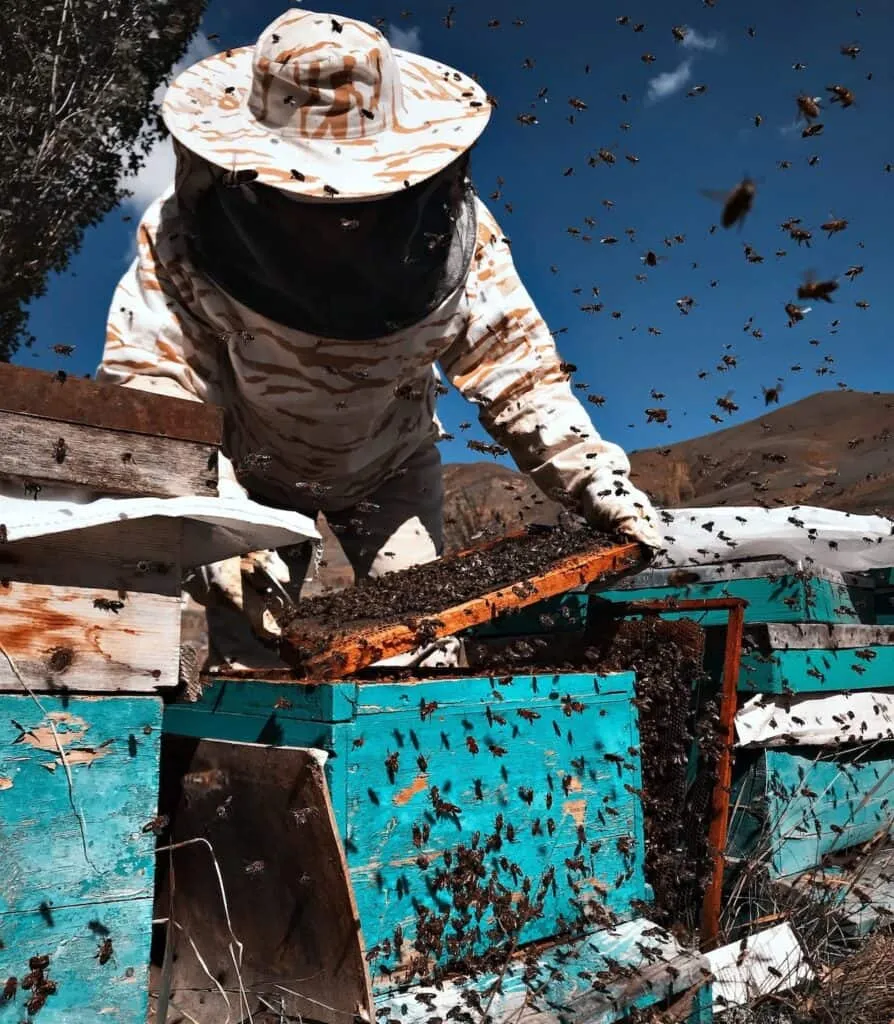
When we are new to beekeeping, we can be a little sloppy. You crush bees unnecessarily as you bang frames when you’re trying to take them out or replace them.
New beekeepers particularly fear bee stings, often working with quick movements that are often jerky and unsteady. When a bee makes contact with its sting anywhere on your body, your arms start flailing, causing the bee colony to feel threatened and turn on defensive behavior.
Handling bees is like dancing with a partner. If you’re nervous, you’re likely to hurt the other party, which causes them to get even right there on the dance floor.
5. Queenlessness
Idle hands, or in this case, legs, are the devil’s workshop, and the devil can be mean.
The queen’s pheromones help to unify the colony, and everyone understands their role.
Without a queen there to release that pheromone, the honeybees get restless.
We don’t know exactly why they get so restless, but you can tell that they are not happy every time you check on an open hive.
6. Robbing
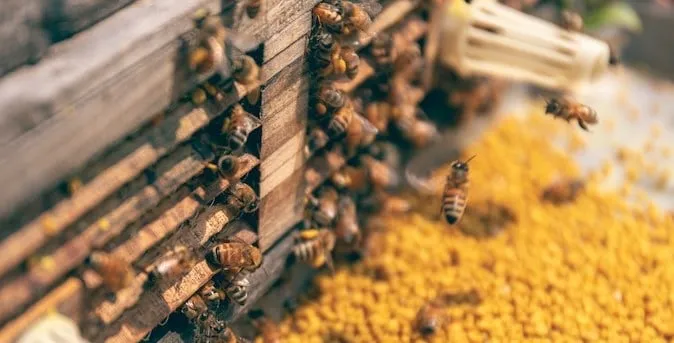
As mentioned, in times of scarcity, you may encounter mean bees. Sometimes, scarcity is caused by a lack of nectar. Other times, big bad bullies and predators come through the hive and do some damage.
Sometimes, it’s other bees. Italian bees are known for this vice, and they pick on smaller colonies. Now, even though the smaller colonies may lose, they fight to the death.
Once robbing begins, everyone becomes an enemy, even you. They want absolutely nothing to do with you. This, in turn, could be one cause of aggression among your honey bees.
7. Bad Weather
In this case of aggression, we are talking hot and humid. This usually happens when good weather draws to a close in late summer.
It starts to get wet, but the weather is still warm, making it difficult for the bees to cure the honey. I can empathize with them.
Imagine doing everything right, and then factors beyond your control mess with your ability to make your deadline. It’s no wonder they are unhappy.
8. Hive Placement
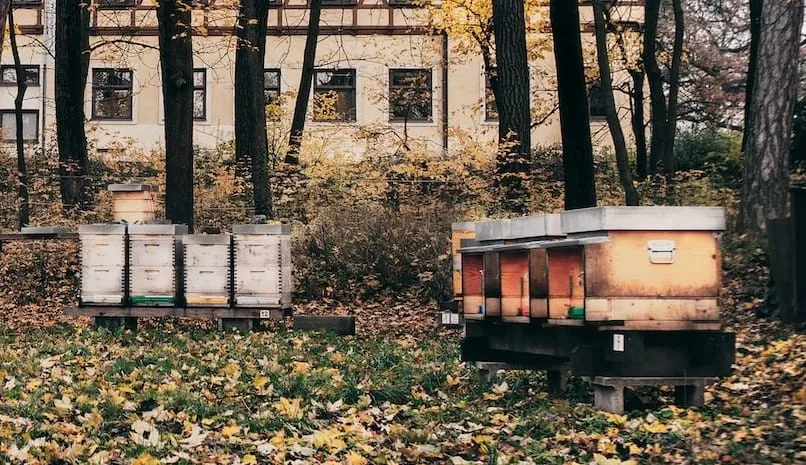
Sometimes, beekeepers place hives in various locations that are solely for their convenience with no consideration for the comfort of the bees.
If the hive is placed next to a path that enjoys a lot of traffic or is frequented by animals, the bees will be in a constant state of alert.
Bees enjoy the quiet. They could also do without constant movement in front of the entrance of the hive.
This is why we, as beekeepers, are advised to approach hives from the back rather than from the front.
9. The Pantry is Full, and Winter is Coming
What would you do if your life savings were under threat? Fight, of course.
That is what the bees are doing when they get defensive about their loot.
When the weather starts to change, the bees are well aware that the season of plenty is coming to an end.
They have a very valuable asset to protect, and they take that responsibility very seriously.
That honey that they have will make the difference between life and death. It’s no surprise, then, that the bees can get stinger-happy.
10. Growing Numbers
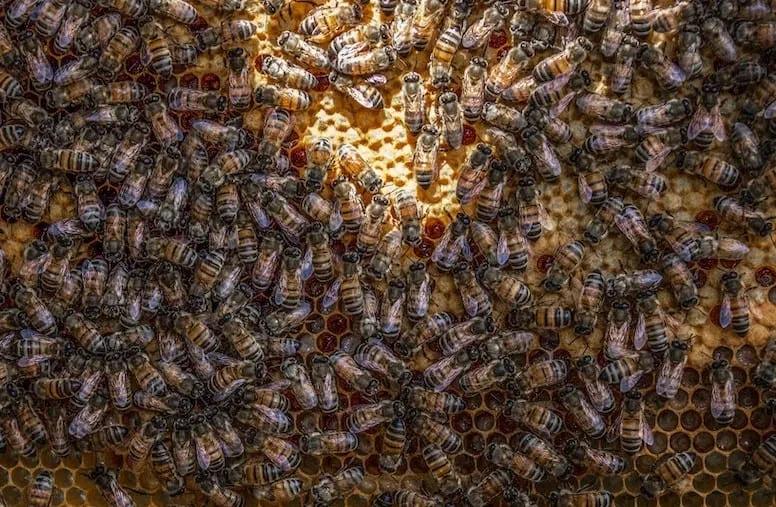
The life cycle of a colony is similar to any organism. They start small, they grow in numbers, and then, at some point, they start to regress.
With bees, the numbers pick up in preparation for spring.
A great workforce is needed to collect pollen and nectar. As the numbers grow, the temperament of the colony can change.
11. Alarm Pheromone on the Bee-Suit
Let’s face it; we don’t like to do laundry. What drives most of us to laundry is social decorum. When we get the opportunity to skip it, of course, we will.
Your bee suit is only worn in the presence of your bees and possibly one beekeeper. So the temptation to keep it unlaundered is very high.
Now, here’s something you may not have considered. Every time you visit your bees, some of the ladies will take their anger out on your full suit. When they do, the sting site is laced with the alarm pheromone.
When you go back for your next visit, it’s possible that the alarm pheromone is still detectable. So even before you open up the hive, the guard bees are already on high alert.
How Long Do Honey Bees Stay Aggressive?
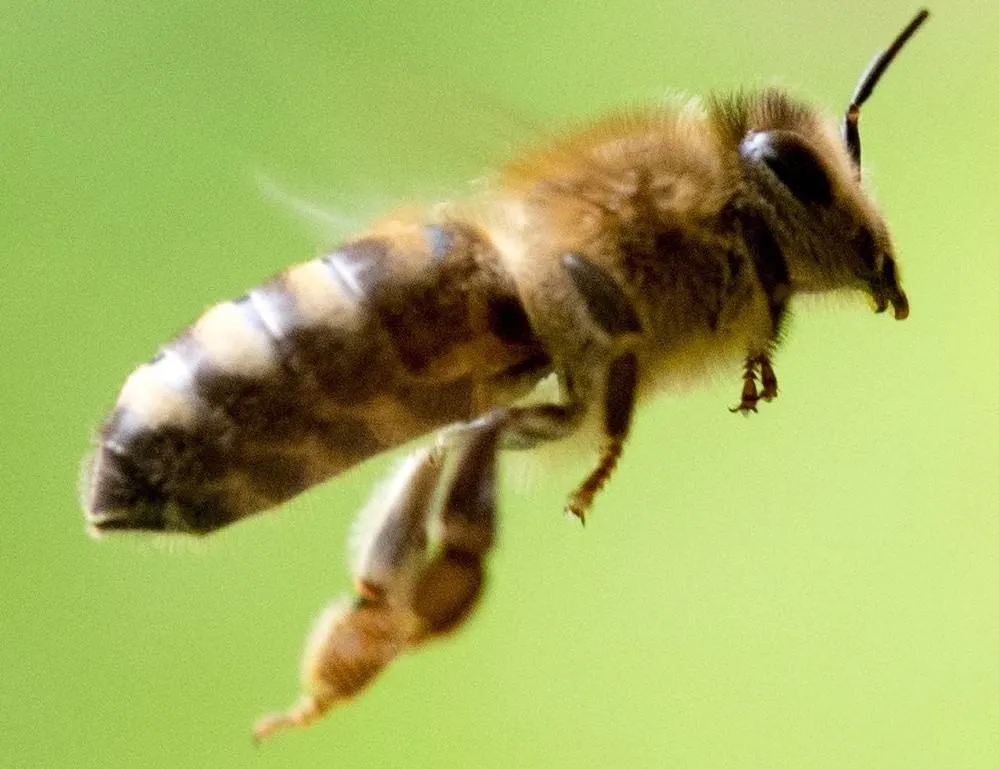
The amount of time that honey bees will remain aggressive depends on the main cause of their anger. That’s why it was important to first discuss the causes of aggression among honey bees so you can begin to narrow down and pinpoint the specific issue.
Although bees usually require a trigger to act and are unlikely to lay siege upon your house unprovoked, having an aggressive colony nearby, say, your back yard is quite risky.
Estimated Time Until Your Hive Calms Down Depending on The Cause of Aggression
If the problem is genetic, then your visits to the hive will continue to get more and more unpleasant as time goes on.
However, if the cause of aggression is environmental, then it’s only a matter of time before they settle down again.
And, if the weather is the reason the bees are agitated, then when temperatures start to cool down, so will their temper.
If the colony is being robbed, putting a stop to that incident will get the temperament of the colony to a more pleasant level. Once the threat has passed, the bees revert to their sweet nature.
Perhaps you may have noticed that the colony had increased its lady-power during the spring and didn’t appreciate your presence. In the fall, when the numbers start to reduce, you’ll get back that gentle colony that you started off with.
If the cause of aggression is caused by the beekeeper, then as soon as you improve your working methods, you will definitely see a difference.
In fact, as you become more confident and at ease with your bees, you move more smoothly when dealing with the hive, and you are less likely to have accidents. That way, you stay on the bees’ good side.
So the short answer to how long your bees will stay angry and act aggressively is, as with most beekeeping questions, it depends. The good news is that their anger doesn’t have to be a permanent situation.
5 Things Beekeepers Can Do to Calm an Aggressive Hive
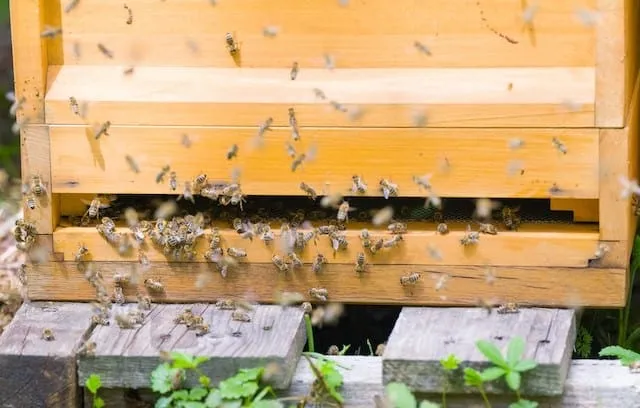
What do you do with an aggressive hive? Well, there are instances that cause honey bees to be aggressive, which are out of your control, such as the weather or genetics.
Luckily, there are changes you can implement that are within your control. As such, I’ve laid out five proven methods that you can use to calm angry honey bees.
In order for you to be successful in your de-escalating endeavors, it is important to have first narrowed or identified the cause of their aggression. Let’s examine some of the ways that you can calm your honey bees down.
1. Re-queen
If the queen you received was marked, then the first thing you need to do is try to find her. The marking is usually permanent and doesn’t get rubbed off.
Therefore if you find an unmarked queen in your colony and you notice that the temperament of your colony has been slowly deteriorating, then it may be time to requeen.
If you live in an area that is at risk of Africanization, then you need to order a queen from a trusted breeder. Ensure that you get a mated queen. If not, you might not solve your problem.
2. Feed your Bees
In times of dearth, you may need to help your six-legged friends. Either sacrifice your harvest or provide supplementary syrup.
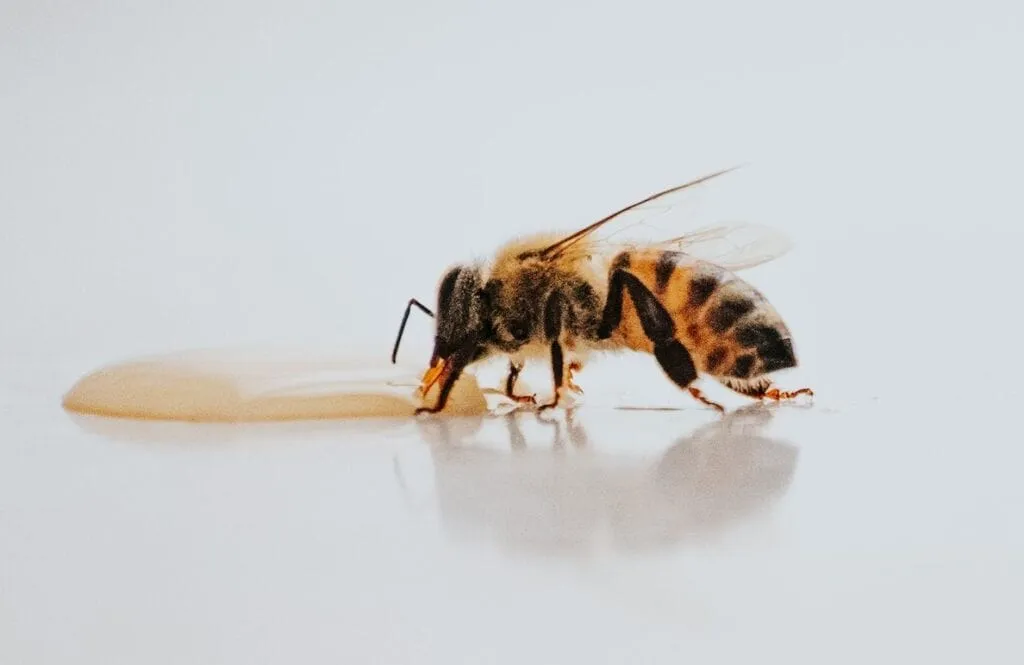
3. Wash Your Bee Suit
Don’t worry about the stains. Propolis, wax, and honey can create a sticky mess on your suit, and that’s quite alright.
Fortunately, your bee suit isn’t going on the red carpet, so the stains don’t matter.
All you’re trying to do is rid your suit of the alarm pheromone. That can be done with a good soak. Once the smell has been neutralized, it’ll be fit for duty once more.
4. Be Purposeful but Relaxed When Visiting the Hive
When you’re new to beekeeping, one cardinal rule is not to be in a hurry. With time and experience, you will be able to tackle your tasks much faster.
When you feel yourself getting anxious, take a deep breath.
Calming your nerves will help you move smoothly through the hive and reduce the disruption to the bees’ routine. The less disrupted they feel, the easier they are to deal with.
5. Use Robbing Screens and Entrance Reducers
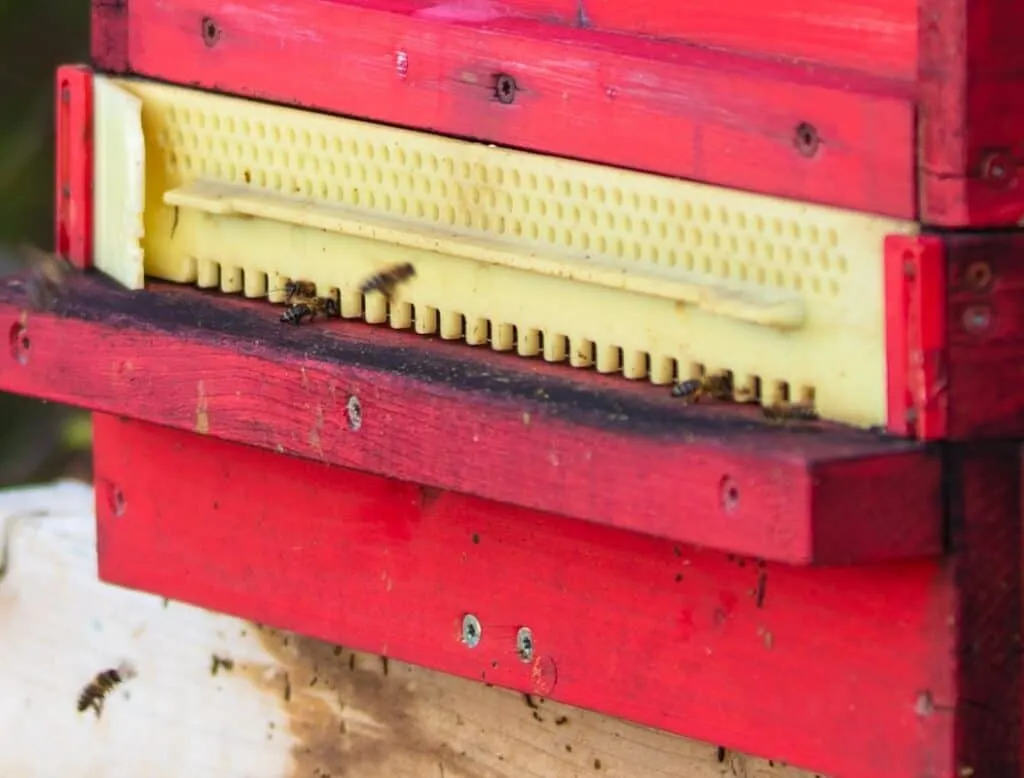
Robbing behavior can be very costly, not just to the victim colony but to you as well. Depending on how strong the robbers are, they can annihilate an entire colony. It’s up to you to protect your bees.
During a nectar dearth, you need to limit the access points robbers can use to get into the hive.
An entrance reducer like this one limits the space available for intruders. It allows the guard bees to inspect incoming traffic more effectively because they have less ground to cover.
Should they detect a bee that doesn’t have that local hive-du-toilet, they are immediately expelled, and a crisis can be averted.
Good robbing screens are similarly effective. Bees usually find their way in and out of a hive by detecting the hive’s scent.
The smell of honey is very attractive to robbers, and they will find their way to the hive, but a robbing screen adds an obstacle for the robbers.
Although they can smell the source, they are unfamiliar with the fixtures and fittings of the hive.
The robbing screen allows the resident bees to move in and out of the hive through a side entrance, which the robbers know nothing about.
The robbers will keep diving headfirst into a mesh and probably won’t take the time to figure out how to get around it.
As an added security feature, avoid opening up the hive during a nectar dearth or when you notice that robbing behavior is on the rise.
Do not put your weaker colonies at risk unless absolutely necessary.
Wrapping Up Dealing with Aggressive Honey Bees
Aggression in honey bees is cyclical. When the environment changes, the ladies can act up a little bit, but they soon settle down, so there’s no real need for alarm.
If you got your bees from a reputable source, genetics are unlikely to be too much of a worry for a year or two at least. Aggression in bees is easily dealt with and is a minor hiccup in your beekeeping journey.
How do you deal with aggressive honey bees? Let me know in the comments below! I’m always looking for new tactics and tricks to add to my arsenal.
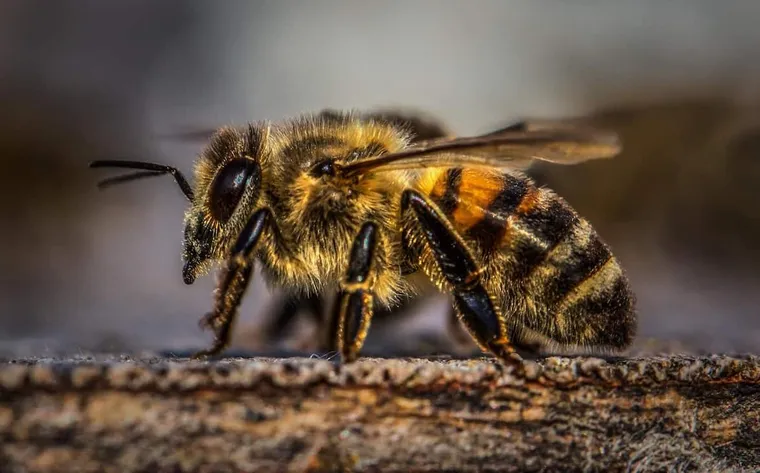
Very interesting and timely! Right now we're housebound until one of our hives calms down. We're in NS, Canada and I'm a new keeper of just 3 years experience or non-experience as this is the first year we're trying to take honey. It's been hot and humid with 2 of our 3 active hives (we lost one this last winter) bearding and while I've been keeping an eye on how full the hives are (we have top bars) I got caught out with one suddenly in the space of a week filling up completely. This morning I went to take a couple of bars of honey to release some pressure and it was a mess! The hive was jammed with bees and I managed to remove 2 bars of uncapped honey and placed them in the unoccupied hive so I had some room to work. Then I noticed catastrophe, 4 bars had basically crumpled under the weight of the honey and there was just a huge mess in the hive. I set about getting this out and managed to do so. Had a full suit on but did have a couple of gaps between my rubber shoes and the bottom of the suit, couple of stings. I tried to get this disaster cleaned up as quickly as possible. The bees went nuts! Having done what I could I retired being pursued by very determined bees for over 50 yds. Eventually I was left alone in the garage but getting to the house was a dash to safety with half a dozen bees getting through the door with me. Unfortunately after taking a bit more punishment I had to use an indoor pesticide. My wife then went for a swim and on getting out of the pool was assaulted, again almost 50 yds from the hive, stung twice. 5 hours later we can't use the back deck so tried the front and were discovered and attacked after about 15 minutes. This has always been a cranky hive but lately was getting more docile. From what I saw in the hive and your comments I think we have way too many bees in that hive, it's jam packed and also the temperature of 29C with humidity giving a humidex of high 30s a contributing factor. This is high for us in SW NS. My bee suit is peppered with stings so it's due for a rinse but I did get enough honey for my bread which was one of the goals! Hopefully we can get back in the pool sometime!
Wow! It is great to hear another beekeepers story. I have 4 hives I am brand new at beekeeping this year. I started with 2 nucs which grew into 2 full deep brood boxes (which I determined I cannot lift to check them both). I lost the queen in one of them and ordered a new queen. Decided to separate the double brood chambers so I can inspect them easier. Now I have 4 hives. 1 with the original queen, 1 requeened themselves and successful. 1 with a new queen I purchased and the last one had a queen hatch but I don't think she has come back. This hive is extremely difficult!!! I can even smell the alert scent and nothing calms them. I didn't see eggs after a couple of checks so I requeened this hive with a queen like the one beside it which is amazing they are a great hive and very gentle. I go in today and no way could I check anything they are extremely angry my suit is full of stings and they pushed against it so much they were actually hitting part of my skin with their stingers. I am at a loss for this hive. I can't tell if the queen I added made it but I really hope she did because if she lays winter bees with her genetics they should be calm she is a buckfast queen. I am going to have to leave this hive until spring and hope it survives and the bees become more happier. I still can't go out my front door they seem to be hanging around looking for me. I am in Eastern Ontario and thanks for the read.
How did it turn out with the aggressive colony? Did they calm down?
I have been a beekeeper for about five years in South Florida. We got two swarms this year. They are doing fine infant I have put on the second deep just recently. BUTTTTT..... those girls just HATE everything and everybody! Yikes. I feel like doing my next inspection with a can of Raid!
Right now with spring coming I want to find the queen and kill her or replace her. The hives are really healthy. A lot of brood and food. spring is this week! So let them replace her and save my self $50. What should I do? I'm reaching for the RAID as I type........ H. E L. P!!!
I wonder what others have told you? I am having the same issue.
I live in Lynn, Mass - 1 year beekeeping and I just moved them into a 10 frame from an 8 frame. I overheard bees are stinging the neighbors children! They were always quiet.
But I gotta get them calm ASAP! I will kill the queen on Saturday. Hopefully they had a plan.. I have so many many bees.
I will give them 18 days then I will buy 2 queens and split the hive
Fantastic information, thank you. I'm a new beekeeper in northern Patagonia, Argentina. Extended dry conditions have created a nectar dearth which is one of the reasons, I think, that my bees have been aggressive. The ladies have also been busy fending off yellow jackets, an invasive species, and chucking out the drones for winter. I can certainly understand why they're not in the best of spirits!
I have an ice pack on my neck from multiple stings as I am reading this article. Lots of great information. I’m guessing my ladies are mad because their queen died before she could be let out of her “cage”. Re queened so I. Hoping they settle down. Of course screaming and running away didn’t help
We don't keep bees but we have neighbours that do. We live in the country side and there are always lots of bees on our flowers. Today we cannot go outside. Evertpytime we are getting stung. I have no idea if they are honey bees or what is wrong. They are quite small and it is hot outside but they are so angry.
I'm one of the newbee's too... Have started with a single colony, brought them with 4 frames from a local beekeeper. But while carrying them home I dropped the box, the lid got open and a few hundred bees got out and apparently flew away... bringing them finally home I could not find the queen, she either were among those escaped bees or I smashed her while closing the lid. Long story short my bees were extremely quite for a week staing queenless, until I couple days ago introduced the new one. I could easily inspect the frames not wearing any suit neither using any smoke. Now with the new queen for whatever reason as I open the lid one or two bees star zigzagging around me, I didn't care at the start but got eventually stung... I cannot understand it now from your post, since you have stated that they are more angry when they lack their queen.
I live in NW Georgia. My husband and I have been beekeeping for about 8 years. Never had a problem and really love it. 2 1/2 years ago, we had our Carni's swarm. We were going to put a new hive in a different place in the spring and start a new hive, but didn't because of all the rain and then my father-in-law got sick so the empty sat there. One day we realized honey bees had moved in to the vacant hive and we let them be for a year. However, these bees (Italians) are pretty aggressive. When we harvested, we left plenty of frames, yet they sent an army to reclaim it. (that never happened with previous hives), they will sting if in a mood and terrorizing my hummingbird feeders that I have had to take them down.
Thanks for your comments everyone, as I'm sitting here tending my stings, I'm glad im not the only one whose ladies have turned on them!
My hive swarmed so I left the remaining bunch alone for a while to see of they would make a new queen, and they have! Today when I got into the busy frames they went straight for my hands, stings all over my gloves, it was a bit gruesome as they pulled thier insides out trying to get away!
I think 3 stings got to my hand, some bad swelling to come I think. Does anyone else think they react worse the more times they are stung over time? Is that a thing?
Thanks for the advice, gloves going straight in the wash! Hopeful for calmer times ahead!
Getting stung multiple times can lead to worse and worse reactions.
This isn't even true. The study always cited for this is proof most people lack reading comprehension and an understanding of statistics. If you suffer anaphylaxis from a bee sting, it is more likely that you had a large localized reaction prior to the anaphylaxis. People cite this study the other way around - that if you have a large localized reaction that you are more likely to suffer anaphylaxis, but this isn't true. It's not what the study said.
Professional beekeepers get stung all the time, and the more they are stung, the less reaction they have.
Take an antihistamine and put some steroid cream on the sting and you'll likely be fine.
Every time you get stung some alarm pheromones stay at the location making more bees sting in nearby areas, try using your smoker on the sting site to minimize the alarm pheromone and continued reaction.
I have been keeping bees for about 8 years now and I have a hive of Italian bees that I started from a package about 4 years ago that have been super aggressive and gotten to the point they attack like African covering my whole body head to toe, I have replaced the queen twice over the last 2 years but no change, I live in Ohio with plenty of food, they share my apiary with other hives that are normal. I can’t work with them so I just add supers which is up to 9 deep now. I am planning on ending this nightmare and this winter exposing them to freeze them and harvest the honey so they won’t be a total waste. 4 plus years of fear and anxiety is enough!
This was so interesting thank you. The comments all helped too. This is my 2nd year with 2 hives. The first year was fantastic. Great calm bees, 11kg of honey and only a few stings. This year both hives swarmed, and unfortunately I was away and didn't requeen. I was only able to look at them in September and they have both become aggressive and the colonies are huge - almost tripled since swarming. I noticed that they are a different colour (almost black) and a neighbour suggested they have become indigenous and known as the European dark bee (I live in France). Come Spring, I'm hoping they will swarm again, and then I can re-queen. Not sure if this is the correct process though. If they stay as they are, I'm not keen to keep them! Would love to hear any suggestions/comments. Thanks!
When you have an allergy the more times exposed to the allergen the stronger the body's response. You might want to invest in an epi pen as you may need it in the future.
If you don't have an allergy, the more times you are exposed, the LESS the reaction is in the future. They also do treatments with microscopic doses of allergens to desensitize people to the allergen. They use bee sting therapy in alternative medicine for the treatment of RA and some other diseases and have ways of making people less sensitive to the sting.
So, if you're getting bad swelling you might look into desensitizing therapy. If you suffer anaphylaxis from bee stings and desensitizing therapy doesn't work for you, you probably shouldn't be keeping bees, and you should indeed have an EpiPen handy at all times.
PS, if you get the run of the mill swelling and pain from a bee sting, the old-time mountain people would wet tobacco (by chewing it, but water works too) and apply it to the sting as a poultice and they say the tobacco would draw out the poison. You'd want to get untreated dried tobacco leaves, you can find them online and have them shipped to you (if you don't live in a nanny state that prohibits the shipping of tobacco), or if you've got a hillbilly cousin in Appalachia, they could probably get you some ;-)
Re queen the hive and move it to a wooded location far away as possible . It will cause you trouble with neighbours and people passing keep quiet bees and you might keep your wife and neighbours.
I have found that hot water works best on bee stings.! By putting your hand or foot in hot water is soothing and reduces the swelling if done straight away after being stung. Use a cloth that been put in hot water then rung out for the face, neck and arms. This method works well for children. Give it a try.
I acquired a hive 2 weeks ago that had been abandoned for 5 maybe 7 years. I moved it at night with it closed up. 2 days later I opened it up. I let the bees settle in for 2 weeks . I went in it today and it was really really bad. The hive was a fortress with the propolis they had applied. It was a very MEAN hive. I was totally, top to bottom, covered in angry bees for 5+ hours. I was miserable. It was 1 brood and 1 super . Massive number of bees. I saw what I needed to know and glimpsed the queen one time. I'll feed them for a week to see if that helps, maybe-maybe not. If not then I'm going to buy two queens, kill the original one, split the hive separating most of the brood frames so newly hatched brood will have a new step-mama. Hopefully the mean brood will succumb or die out. Plus will end up with 2 hives instead of one. Thanks for all the chat. Anything always helps. Personal experiences are great info. "Beez Geez."
I'm new to beekeeping and have been able to feed the bees each day without protection. They have been ignoring me completely. Now things seem to be changing. They are following and buzzing around me when I'm outside and buzzing around me when I'm in my garage/workshop. I donned my bee jacket and hood this morning and sat on my deck. In less than a minute I had five bees buzzing me and landing on my jeans. The hive is about 40 feet away, and I utilize a hive entrance (sugar water) feeder as well as two more on the top of two fence posts. They have food. Any ideas?